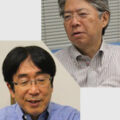Japan and China: Cold Political Relations, Cooling Economic Ties?
The Japan-China relationship is at its worst ever.” “Bilateral economic ties are no longer warm amid cold political relations.” Expressions like these have characterized Japan-China relations for quite some time now. Against this background, I recently visited China to participate in the Japan-China Think Tank Forum hosted by the Shanghai Institute for International Studies on the topic of “How can we implement a breakthrough to resolve the strained bilateral relations?” Holding a track II meeting like this could be interpreted as an indication that the Chinese government is determined to move the strained bilateral relations forward.

YOSHIZAKI Tatsuhiko, Chief Economist, Sojitz Research Institute, Ltd.
The conference was held on May 10th, directly after a series of visits to China paid for by delegations consisting of senior lawmakers of Japan’s Liberal Democratic Party (LDP). At the same time, Prime Minister Abe Shinzo was visiting Europe, and he directly criticized China’s military expansion at NATO headquarters. The effect of the lawmakers’ visits, which aimed to ease the bilateral strain, rather appears to have been more than offset by Mr. Abe’s remarks about China. This being the case, tough words were exchanged during the conference over territorial issues and the differing perceptions of wartime history between the two countries.
Notwithstanding this, in my view based on my experience as an economist, it could sound rather misleading to say, “Bilateral economic ties have become cool amid cold political relations.”
To take bilateral trade statistics alone, Japan’s exports to China in 2013 (calendar year) amounted to 12.6 trillion yen (up 9.7% year on year), while its imports increased to 17.7 trillion yen (up 17.4%). Moreover, the content of exports and imports between the two countries has become increasingly high-tech. Today, communication devices (smartphones, tablet PCs, etc.) are China’s second largest export to Japan. Indeed, Japan’s imports of communication devices from China reached the 2 trillion yen mark last year, nearly four times the level of five years ago.
Meanwhile, Japan’s fastest-growing exports to China are scientific and optical instruments totaling 800 billion yen, double the level five years ago. It seems likely that most of them are used as raw materials for smartphones and other goods in China. What this means is that a win-win relationship is essentially in place already, away from the worsening political strain, when it comes to trade between Japan and China.
It is often pointed out that Japan’s direct investment in China has fallen in recent years, but in fact it only declined to 7,060 million dollars in 2013, from 7,380 million dollars in the preceding year, which reasonably suggests that the number for 2012 was unusually high. Even now, Japan remains the third largest nation in the world in terms of investment in China. Given this, I must say that it is not reasonable to conclude that Japanese companies have begun shunning the Chinese market.
Foreign direct investment in general can take various forms. In my view, the most successful type of foreign investment is one that allows local returns to be reinvested locally. The amount of reinvestment by Japanese companies in China would be quite substantial, as there are many Japanese companies operating there already.
It must, however, be noted here that direct investment by Japanese manufacturing companies in China has declined, reflecting higher wages in recent years, while investment has seen an increase in non-manufacturing sectors such as wholesale, retail, finance and banking, insurance, and real estate. In other words, the Chinese economy’s center of gravity is shifting from manufacturing towards a consumption-based economy.
Some of the participants belonging to the generation that “dug the well” (meaning that they helped establish the foundation of Japan-China relations in the past) have expressed nostalgic feelings about the good old days of peace and friendship between the two countries. However, these feelings seem to have been shared among politicians only at each end.
Looking at the magnitude of trade and economic exchange alone in terms of both quality and quantity for the sake of comparison, there is obviously a huge difference in scale between today and the days when the well was dug. A lot more people travel between the two countries today. The number of international marriages between Japanese and Chinese today is five to six times higher than it was in the 1980s. Cultural exchanges have also expanded to cover a broader range of content. In addition to works by Murakami Haruki, novels by Watanabe Junichi have attracted many Chinese readers, which came as a surprise to me only recently.
It is true that the age when Oshin was aired on TV makes me feel nostalgic for the peace and friendship between the two countries, but we cannot turn the present age of AKB 48 back in time. There appears to be no other option for us but to build new Japan-China relations that are appropriate for the new age, without merely seeking to cherish our memories of the good old days between the two countries.
Be that as it may, I sincerely hope that a summit meeting will be held between Japan and China. In the end, it all comes down to the decisions of the two leaders.
Translated from “Jihyo 2014, Nicchu wa ‘Seirei keirei’ towaiukeredo (Column on Current Events 2014, Japan and China: Cold Political Relations, Cooling Economic Ties?)”Chuokoron, July 2014, pp. 20-21. (Courtesy of Chuo Koron Shinsha) [July 2014]




